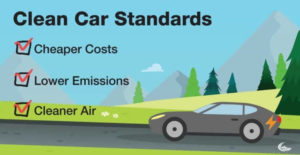You might’ve seen the phrase “clean car standards” popping up in your Facebook and Twitter feeds this week. While your local environmental and public health organizations celebrated the new standards, you might’ve felt a bit out of the loop. Let’s break down what the clean car standards are, why Coloradans pushed for them, and what we can expect from them.
First, what are the clean car standards?
These standards regulate the emissions and pollutants from car tailpipes and are based on the “fleet average” (or all of the cars in the state by a given manufacturer). With transportation as the biggest source of pollution in the U.S., lower emissions and less pollutants from tailpipes is always better.
The “cleaner” our cars are (i.e., the less they pollute), the better we are able to protect our environment, our communities, and our economy. As we increase the market share of “clean cars,” which include hybrids and electric vehicles, we are spurring innovation, offering consumers cheaper, more fuel-efficient cars, and helping improve the air we breathe.
Why Colorado needed to act? The Trump Administration is undoing a rule that promoted clean cars.
The Environmental Protection Agency (EPA) has taken major steps (and there are more to come) toward weakening a 2012 rule that set fuel efficiency standards to cut the nation’s greenhouse gas emissions from cars and help Americans save money at the gas pump. These federal standards have already saved $550 million in car costs for Coloradans. But with EPA Administrator Scott Pruitt at the helm, it’s an industry-wants-industry-gets world, with little concern that the agency’s rollback announcement could splinter a burgeoning electric-gasoline auto industry.
Rolling back the fuel-efficiency standards will add 4.5 million tons of carbon pollution to our skies every year and increase smog-causing air pollutants that cause asthma and make it harder to breathe.
Dirty air is unhealthy for all of us, but children, the elderly, and people suffering from lung disease or asthma — including 343,000 Coloradans — are the most negatively impacted. Communities of color and working families are also disproportionately impacted by these health effects. More air pollution means more coughing and wheezing, increased risk of infection, and permanent damage to lung tissue.
But there’s good news, even with the federal rollbacks. Governor Hickenlooper took action to make sure we keep seeing the benefits of vehicle emission standards! He just announced that Colorado will adopt new standards that reduce pollution from vehicles.
Governor Hickenlooper’s leadership comes at a critical time for Colorado. Denver was ranked the 11th most polluted city in the nation for ozone levels — and vehicle emissions are one of the largest contributors. Adopting the clean car standards will protect the clean air and clear blue skies we all cherish.

Clean Car Standards are a great move for our economy AND environment!
According to a recently released report, with the clean car standards in place, Colorado would save roughly $16 to $37 million in health care costs by 2040; reduce the number of work days lost due to illness from air pollutant emissions; and save $260 million per year in social costs from long-term damage caused by carbon pollution. Cheaper costs, lower emissions, and cleaner air: it’s not hard to see why we’re so excited.
Share this video if you’re glad Colorado is moving in the right direction.
Want to keep up with the latest news about Colorado’s environment? Follow Conservation Colorado on Facebook and Twitter.



